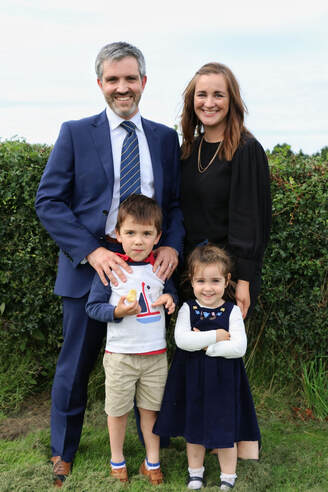 This week marks one whole year since I began to serve as Pastor-Teacher at BCFC. Here are some selective reflections on the past 12 months, and on some hopes for the year(s) ahead (God willing, of course). I hope these resonate with you, so that together we can encourage each other in the great task of making Jesus known. 1. Thus far the Lord has helped us I want to start with some of the things we are regularly thankful for. When we first committed to come to Banchory there was the small matter of what to do about housing. We were keen to live in the community, but had a house in Balmedie to sell, and a housing market that wasn’t exactly buoyant. Together, we took a step into the unknown and God was very gracious to us. We are very grateful to the church for the support to move into Banchory, and especially thankful to the Lord for a prompt sale of our house. Moving is hard – literally unsettling. Settling into a new local community and church community takes time. We have been very blessed by how well our children have settled in Banchory, and how quickly the ‘new house’ became simply ‘home.’ If you have ever moved church you will know how long it takes to feel ‘at home.’ And yet for the four of us we have felt very much welcomed into our new family – people have opened their hearts to us and we are very grateful for the warmth we have found here. On a personal note, I have been encouraged by the general responsiveness of our church family to the word of God. I realise that a ‘new’ voice is often easier to listen to (for a while!), but an eagerness to hear from God in his word has been helpfully confirming, and is something I pray will always mark out our church family. Nothing builds up your soul quite like being around people who love Jesus – and that has been the case for us in this year. 2. Through many dangers, toils and snares… Of course, the last twelve months have not been entirely plain sailing – all of us can testify to that! One of the difficulties has been the challenge of contraction. For some time, the church had the privilege of two full-time pastors, and with that comes an expansion of ministries. Conversely, when the staff team shrinks the whole church has to pick up the slack. But we also know that our church has contracted numerically in the last few years, and so while many people have been working very hard, we have often felt stretched and very dependent on one or two individuals for ministries to be maintained. I’m sure many have found this a difficult adjustment. And there’s Covid-19. Of all the things we anticipated for 2020, none of us were quite ready for an influenza pandemic. The effects have come at us in waves: fear… suspicion… anger… loneliness… optimism… disappointment… sorrow… fear again. And for the church, and for your Pastor, there’s no manual that says, ‘here’s what you do in a pandemic.’ We have all had to find our way and make the wisest choices we can. Technology has served us well in the last 5 months, but it has been no substitute for gathering together, embracing each other, singing with each other, hearing from God’s word together, remembering the Lord in Communion together. I have missed this more and more with each passing week. And the uncertainties of how long restrictions will continue has meant significant planning as a church has been almost impossible. And now we’re trying to navigate a partial re-opening – please pray!! Along the way, whether it be lockdown, or a complicated pastoral situation, some have asked, ‘if you’d known you would have to deal with this, would you still have come?’ (I do wonder if any one of us knew what difficulties lay ahead, whether we would ever get out of bed in the morning!) But even though the challenges we’ve faced as a church wouldn’t necessarily be the challenges any of us would choose, I count it an enormous privilege to help shepherd this part of the flock of Christ. All of the encouragements we have known in the last 12 months have served to confirm that this really is where God wants us to be – and that is exciting. The Christian life is not so much about being anxious about tomorrow, but being confident that whatever tomorrow brings, you face it unbreakably united to Jesus Christ, dependent on his grace. 3. Facing a task unfinished So where do we go from here? It is never our job to re-invent the church. The things that built up and multiplied the church throughout 2000 years are the same, in principle, today. But churches (including ours) need to be reminded of all that it means to be the church of Jesus Christ. Let me mention a few that stand out to me as areas for particular (and constant) attention – maybe they resonate with you too. I keep coming back to the mission of the church – summed up in the Commission Jesus gave to his disciples to go and make disciples of all nations (Matthew 28:19). To make disciples is not just about discipleship for new converts, it includes bringing people into the family of God (that’s why Jesus tells his followers that baptising is essential to the task). We are privileged to be located in a growing local community, but when that is not at least matched with a growing church community then there are some things we must do. The first is to pray. We don’t have the power to grow the church – God alone can do that. That’s why we must be a praying church, praying for God to bring people to salvation. And the other thing we must do is be intentional evangelists. Yes, as a church we place the gospel front and centre of everything we do, but evangelism doesn’t take place until someone is brought into contact with the Gospel. We could have slick services and videos that are gospel focused – but if no one is listening, they will not achieve anything. We can have good relationships with those who aren’t yet Christians, but if we never look for ways to introduce them to Jesus, then we cannot expect them to ever come to faith. And we must not engage in evangelism just because we want a bigger church, as J I Packer put it, the enterprise required of us in evangelism is the enterprise of love: an enterprise that springs from a genuine interest in those whom we seek to win, and a genuine care for their well-being…[1] And if we don’t have that motivation, then we must go back to where we started – pray. Growth in the life of a church is not only numerical, but is also growth in stature (Ephesians 4:13). This happens as believers become more mature. We would never be content to let our children stop growing – it would be damaging for them on many levels – and similarly we must not be content to stop growing as Christians. When we stop growing, the church stops growing. I especially see this as a challenge for men. In general, Christian women are much more pro-active in growing in their faith: they tend to read more; more regularly meet with other Christians; more readily talk about their faith. For the church to grow we need women AND men growing in faith. I especially want to help men aspire to grow in their relationship with Christ; to develop their gifts and abilities to serve Christ. I would be very keen to hear from all of you about how you think you could best be helped to grow (I also need your help if I’m to grow too!). One tool is North East Scotland Gospel Training (NESGT). This is an initiative I helped to set up which is aims to help ordinary Christians grow. It is a two-year course which runs on Monday evenings (7.30pm), with a fairly broad curriculum. It begins on Monday 17th August with Jeremy McQuoid giving us a Bible Overview. You can find details and sign up on our website (www.nesgtraining.wordpress.com). It is open to all, but if I might pick on the men again – what if a group of us committed to do this course together? Last of all, the numbers of evangelical Christians in Scotland seems to have plateaued at an all-time low – probably somewhere between 1-2% of the population. When church life is busy it can be easy to overlook the fact that significant chunks of our country are unreached with the Gospel. More than ever churches have a responsibility to help equip and train people to be ministers of the Gospel. If we are to see the church in Scotland grow, then we will need men and women equipped to serve in Gospel ministries, to plant churches, to faithfully shepherd God’s people (2 Timothy 2:2). What if our church invested in ministry training? What if we offered opportunities for interns, or a trainee Pastor, or short-term ministry placements (or all of the above!). Any church that is concerned for the work of the Gospel nationwide will have an eye to training people for ministry – how about us? Our church vision statement declares: We want BCFC to be: a growing community of committed followers of Jesus Christ. This needs to be more than good theory condensed into a short sentence, it has to be reality. The church that is not growing in these ways is in danger. And that starts with each one of us – who can you come alongside to help follow Jesus better? How can you let others help you to grow? I would love to hear from you on any of these reflections – we need to travel together on the path the Lord has laid before us, but always confident that He leads and He builds the church. With enormous gratitude for the last 12 months. Duncan [1] J I Packer, Evangelism and the Sovereignty of God, 79-80.
0 Comments
 J I Packer (1926-2020). Image: desiringgod.org J I Packer (1926-2020). Image: desiringgod.org In the last week, the theologian J.I. Packer went home to be with the Lord. He would have celebrated his 94th birthday today. I never met Packer, nor even came close. And yet his passing moved me in a way I wasn't expecting. Perhaps it would be understandable if this was a tragic death, maybe if this was God's man cut down in his prime. But there is no tragedy here. Packer was a man who lived a long and fruitful life serving Jesus Christ - a man extraordinarily gifted by God, who seemingly took every opportunity to use those gifts to proclaim and defend the Gospel. So why did his death cause me to stare into the middle distance for long periods? There are at least two reasons. 1. It is profoundly moving and inspiring when a Christian finishes their pilgrimage well. Packer became a Christian when he was 18 years old and almost immediately began to devour the writings of the Puritans (especially John Owen). He published his first article (on the Puritan understanding of justification) when he was in his mid-twenties. This was but the start of a prolific writing career that would span the next six decades. Throughout those years his commitment to the authority of Scripture, to the Gospel, to the need for personal holiness - all these were reflective of his enduring personal commitment to Jesus Christ. And I have no doubt that he would be the first to give all the praise for that endurance to God alone. It is surely the mark of a believer to eagerly long for the day when the Lord Jesus greets us with his 'Well done, good and faithful servant' (Matthew 25:23) 2. Reading a book that changes you for the better is like gaining a friend. These last few days have caused me to reflect on the way that Jim Packer became my friend at specific periods of my own Christian pilgrimage. There are actually several books that I have reached for in my reflections. In a recent project on the doctrine of Scripture I found great encouragement in a collection of Packer's writings called Engaging the Written Word of God. His essay on The Adequacy of Human Language, still sticks in my mind. Scholarly, clear, logical, unapologetic and always building confidence in the Scriptures. I remember the joy I found in Packer's A Quest for Godliness: The Puritan Vision of the Christian Life. Here was my introduction to the Puritans; my gateway into reading the likes of John Owen, which was hugely formative in my own walk with Christ. Here I found some of my first eye-opening (and mind-blowing) moments on doctrines such as the Trinity, the atonement, preaching, the word of God. In my mid-twenties I was introduced to his best-selling book Knowing God. To flick through the pages of it again today has been a reminder of what a precious resource this is for the church. In digestable portions Packer helped walk me through what it means to know God. What better way to spend time with a friend than thinking together about the knowability of God, the attributes of God, the heart of God towards us in the Gospel. It is still thrilling. Listen to Packer's goal and make it your own: "Our aim in studying the Godhead must be to know God himself better. Our concern must be to enlarge our acquaintance, not simply with the doctrine of God's attributes, but with the living God whose attributes they are. As he is the subject of our study, and our helper in it, so he must be the end of it. We must seek, in studying God, to be led to God. It was for this purpose that revelation was given, and it is to this use that we must put it." (Knowing God, p.22) And even though J I Packer has gone on to his reward, his writings will be valuable to the church for generations to come. If you have never read Knowing God (or any of Packer's works) it will be one of the soundest investments you could make - you will gain a friend.  It is undoubtedly the case that unlike any other time in recent history people are asking BIG questions. As Christians we need to be ready to offer what answers we can - and very often we feel inadequate for the task. Fortunately God has blessed us with gifted individuals who can help us. John Lennox is one of them. The Good Book Company have published a short (~60 pages) little book tackling the biggest question of our times, Where is God in a coronavirus world? I want to commend this book to you. Maybe you are wrestling with that question yourself - maybe your confidence in God has been shaken in these times. Here is a biblical response that will not take away much of the sorrow of these times, but will restore our hope as it gives us reasons to remain confident in Christ. I have several spare copies of this - if you need one, just get in touch and I will do what I can to get it to you. Alternatively you can order from the Good Book company website (the book is only £2.54). I want to especially encourage you to use this as a resource to distribute to others - be sure to include some contact details or include some details about our online services. This short book is an excellent and timely tool for the church to make use of. "Perhaps the coronavirus might function as a huge loudspeaker, reminding us of the ultimate statistic: that one out of every one of us dies. If this induces us to look to the God we may have ignored for years... then the coronavirus, in spite of the havoc it has wreaked, will have served a very healthy purpose."  Back in the days when we presumed a lot about the future, we had planned to hold a Good Friday Communion service. Things have changed... though some have asked why we aren't trying to transfer our Communion service online. Below is an article I've written explaining in a bit more detail why I think it's more beneficial for us to wait on the Lord. MANY of us have reflected on how the church might have coped with this period of isolation had it taken place 25 years ago. Access to video conferencing was not an option – indeed, Facebook was not yet a twinkle in its father’s eye. We have been blessed to have technology to hand – not only the technology that makes meeting ‘face-to-face’ possible, but also the ability to put together a Sunday service that is for the most part livestreamed to the church family and beyond. It has taken a lot of effort to move the church calendar away from gathering in-person, to online platforms. Even though some things have had to fall by the wayside, some new initiatives have been tried as well. And yet one thing seems notable by its absence. Communion. To some that seems strange – Christians remembering the Lord Jesus’ death by taking bread and wine is fundamental to what it means to be a church. So why not? Many churches are making provision for this, but I don’t think it would be the most helpful step for our church family, for several reasons. 1. Bread and wine are not the only symbols As we gather for communion the symbols loom large before us: the single loaf that will be torn into pieces and the deep redness of the wine – they are powerful and emotive. But what is easily missed is that we ourselves make up an essential part of the symbolism when we partake in communion. “Because there is one loaf, we, who are many, are one body, for we all share the one loaf.” (1 Corinthians 10:17) Here, Paul shows us that communion, by its very nature, is a shared meal. This explains why, when he goes on to correct the Corinthians misuse of communion in Chapter 11, he repeatedly frames his instructions around when you come together (four times, all in relation to the Lord’s Supper: 1 Corinthians 11: 18, 20, 33, 34). It is not uncommon to think of communion as ‘me remembering the Lord’ – and of course that is true. But more accurately it is ‘us remembering the Lord’ and thereby showing our oneness in Christ. Communion is given as a means for the invisible church to become visible as the local church – and therefore our geographical location when we share in this Supper is not incidental, but is foundational. The body gathers together to share in the one meal and is reminded of the death of Christ, but also of the body of Christ, which he died to save. This is my main reason for not trying to maintain communion in isolation – bread and wine are not the only symbols. 2. Not being able to meet is horrible Secondly, I must admit I fear the effects of normalising ‘online church.’ One thing that moving our church activities online brings with it is convenience (assuming you can master the technology). I don’t have to travel to get to church, I don’t have to shave, I don’t have to try and corral the children to get ready etc. Maybe we could get used to ‘doing’ church in our living room or at the kitchen table on a laptop? Our inability to share communion serves as a helpful nudge away from getting too comfortable. When God made the first human being it quickly became apparent that is was not good for the man to be alone (Genesis 2:18). And though the solution was to provide Adam with a wife, the principle is true in general – human beings are social creatures. As we’ve been considering in our Bible Study Groups this month, the church is a Gospel Community, in which the members have a shared life together. Even our future hope is that we will be raised from the dead in new bodies – we will live a physical, fully embodied existence in glory with one another (cp. 1 Corinthians 15:35ff.). How much less enriched would our lives be if our only interaction with other Christians was through a screen. I am confident that the Lord Jesus continues to build his church in the midst of isolation, but do not be deceived by the convenience of technology – not being able to meet is horrible! And the absence of Communion serves as our reminder that our best efforts ‘online’ are not a substitute for sharing together physically and joining together in-person to hear God’s word and respond to it. As an aside, I think there are other important lessons here. This is a time to remember that there are Christians who have already been in a ‘lockdown’ for some time due to ill-health. This time of isolation needs to fill us with empathy for their everyday struggles and help us to ensure that we use all means at our disposal to allow them to have meaningful contact with the church family after Covid-19 has passed. 3. What does the Lord want to teach us? I have never been the ‘tech guy’, and so have grown in admiration for those who are. It seems that every problem we’ve faced has been met and overcome by someone in the know. Frankly, we would not be able to do what we’re doing without them. But what if some problems arise for another reason? What if a difficulty comes our way, not to get us to show some clever problem-solving, but to teach us something else altogether? This is where I want to close this short thought: in a time where we can’t share in the Lord’s Supper, what does the Lord want to teach us? It should be the case that every Christian is disappointed not to be sharing communion with their brothers and sisters in Christ – but there’s no other option at the moment. We want to keep the feast; instead we have an enforced fast. And with fasting comes yearning. My prayer is that this period of isolation will generate more and more within the community of God’s people a longing to meet again and to share communion again because we yearn for more of the Lord himself. This is the purpose of fasting in the Scriptures, that we might deepen our relationship with God (e.g. Ezra 8:21), and so let’s use this time to ask God to produce that within us, so that we eagerly anticipate the day when we do meet together again and rejoice together in our oneness in Christ. “As the deer pants for streams of water, so my soul pants for you, my God. My soul thirsts for God, for the living God. When can I go and meet with God?” Psalm 42:1-2 |
AboutA place for reflections, book reviews and more... Archives
August 2020
Categories |
 RSS Feed
RSS Feed